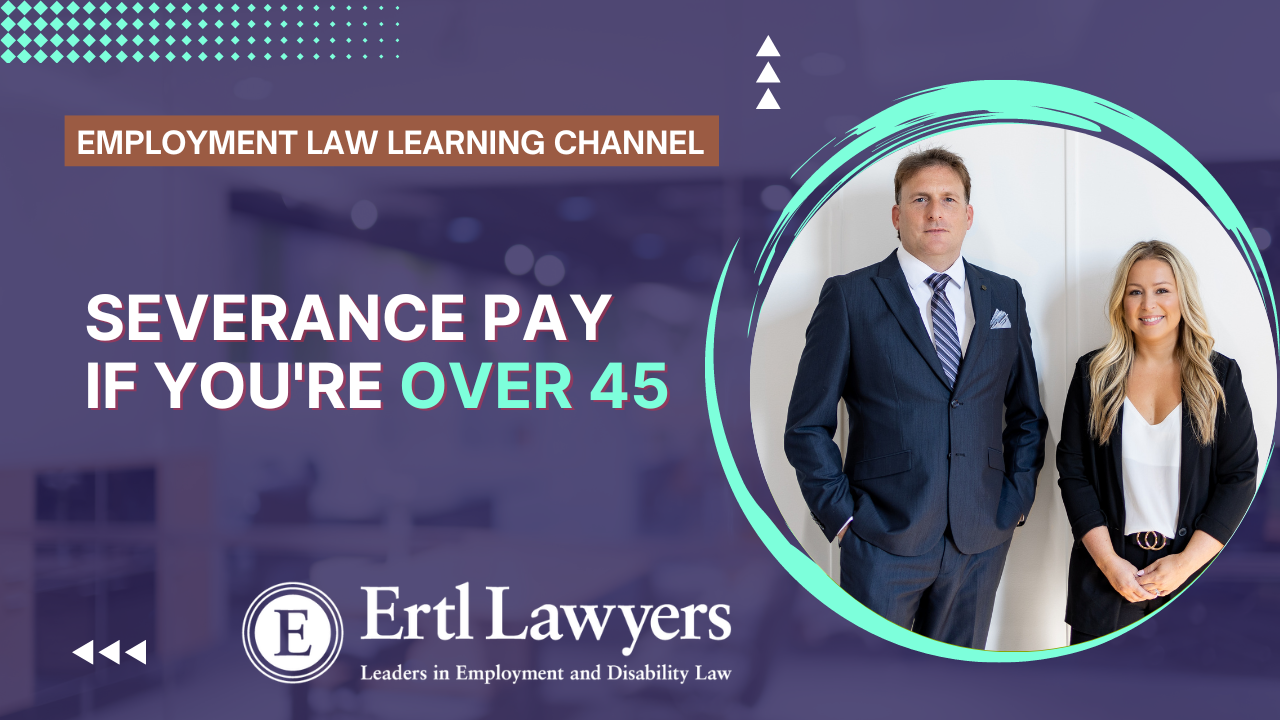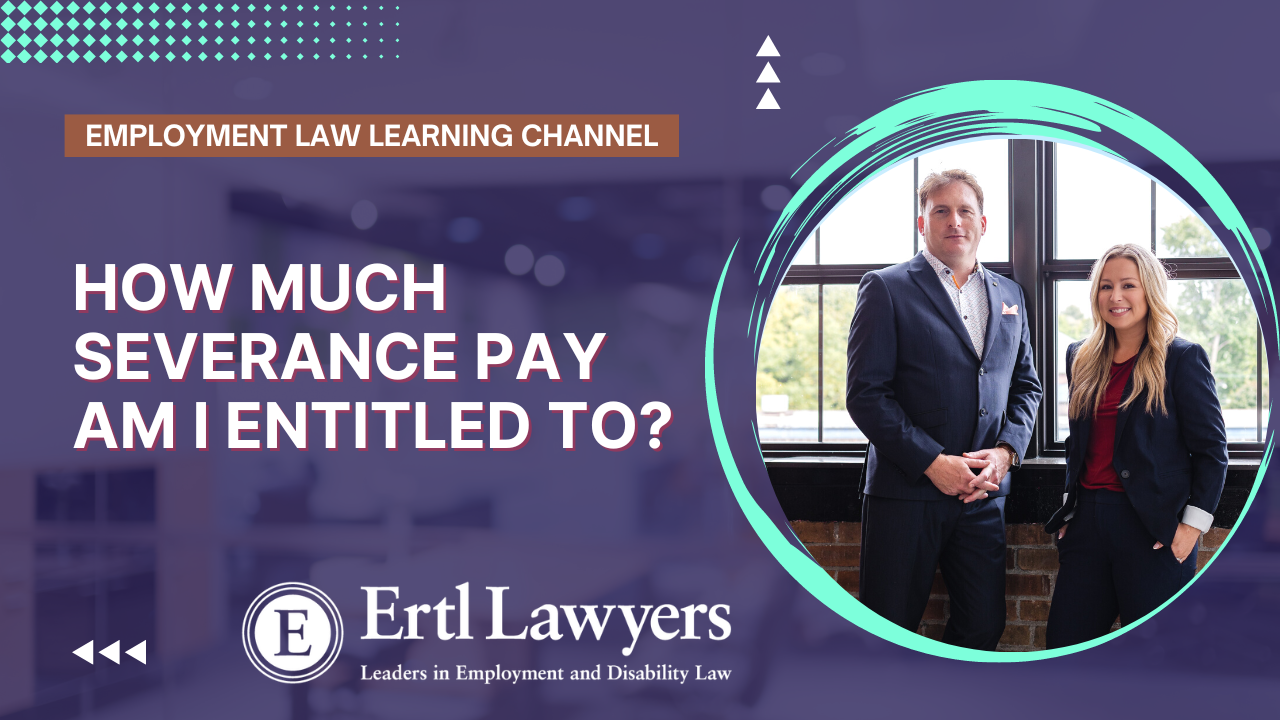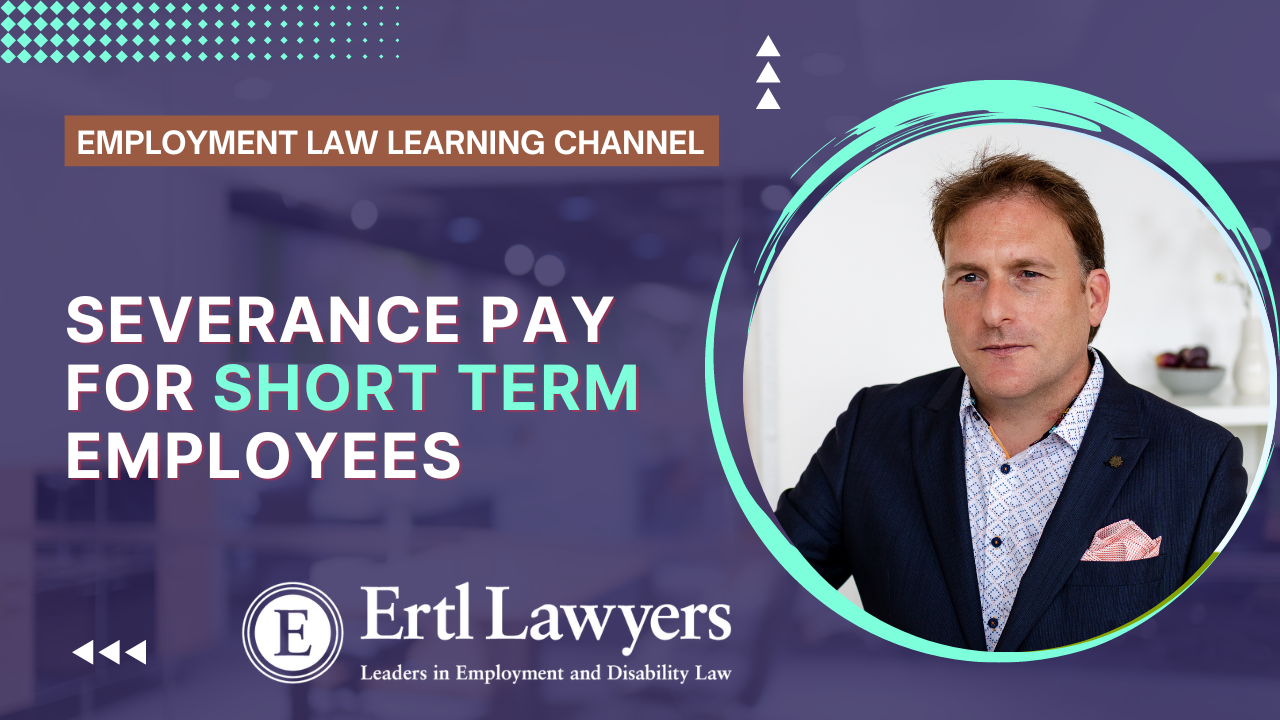Wrongful Dismissal

Wrongful Dismissal (Overview)
What does wrongful dismissal mean? In this article, we will discuss what wrongful dismissal is, what to do if you think you’ve been wrongfully dismissed, and what remedies are available if you have suffered a wrongful dismissal.
We will also discuss:
- compensation for wrongful dismissal
- how long your matter might take
- how wrongful dismissal affects employment insurance
- whether you should make a complaint to your provincial employment/labour ministry
- what an experienced wrongful dismissal lawyer can do for you
After reading this article, if you wish to discuss your wrongful dismissal matter, Ertl Lawyers offers a free consultation. No strings attached. No obligation.
We also offer fair and flexible billing options, like contingency fees (don’t pay unless you win).
What is wrongful dismissal?
Our courts came up with the term “wrongful dismissal”
Your termination of employment is a “wrongful dismissal” if your employer fails to provide you with proper advance notice of your termination or pay in lieu (i.e. severance pay).
Types of wrongful dismissal
A wrongful dismissal typically happens in one of three ways:
Without Cause
This is when an employer terminates you without cause (i.e. no fault of your own) and fails to provide adequate advanced notice of termination or pay in lieu.
With “Cause” or with “Just Cause”
Here the employer inappropriately alleges “cause” (for example, due to misconduct) and fails to pay you any compensation whatsoever.
Constructive Dismissal
In this case, the employer makes a fundamental change to your employment relationship (e.g. reduced pay, fewer hours, demotion) without your consent. It is usually done without any advanced notice. At law, it is considered a “termination of your employment”. And if the employer doesn’t provide proper severance pay, it is considered a “wrongful dismissal”.
Does the reason for my dismissal matter at all?
If you are terminated without cause, the reason doesn’t generally matter – as long as the employer provides you proper notice or severance pay.
Again, it is the amount of notice or money that determines whether your termination is wrongful.
But, if the manner of your termination was especially harsh or conducted in bad faith, you might be entitled to compensation in addition to compensation for wrongful dismissal.
We will discuss these additional types of damages later in this article.
How to know if you’ve been wrongfully dismissed
Wrongful dismissal concerns the amount of notice or severance you were offered. If it’s too low, it’s wrongful.
So the key question is: how much notice or severance pay am I entitled to?
The amount of notice or severance pay is determined by three things:
- Provincial employment legislation
- sets out the bare MINIMUM you are entitled to
- usually between 1 week and 8 weeks
- calculation only considers one factor: your length of service
- Common law
- sets out the MAXIMUM you might be entitled to
- based on the concept of “reasonable notice”
- in almost all cases, it is more generous than employment legislation minimums
- can be as much as 24 months of pay
- the calculation considers factors such as: age, length of service, type of job, employability
- Employment contract
- Your contract might contain a termination clause. It might set out precisely what you are entitled to if you are terminated.
- The clause can provide for more than the provincial minimums or limit you to just the provincial minimums, but it can never provide for less than the provincial minimums.
- Caution: For a variety of reasons, these termination provisions are often void or unenforceable. It is crucial that you have an experienced employment lawyer review the contract and your severance offer before you take any further steps.
- In the absence of an enforceable termination clause, you are entitled to common law notice or severance!
What am I entitled to if I have been wrongfully dismissed?
Generally, if you have been wrongfully dismissed, you would be pursuing more money, often referred to as “severance pay” or “termination pay” or “wrongful dismissal damages”. They basically mean the same thing.
You can try our severance pay calculator to estimate how much notice or severance you ought to have received.
How do I figure out how much I am entitled to?
Calculating the MINIMUMS under your provincial employment standards legislation is straightforward. It’s a fixed formula. It differs from province to province, but it’s a fairly small amount.
However, calculating your potential common law severance pay is far more difficult.
When we represent clients, we use our experience combined with databases of information about thousands of wrongful dismissal cases across Canada from the last 50 years.
Although it’s no substitute for a lawyer’s experience, we’ve created a severance pay calculator tool to help you “ballpark” your potential severance pay entitlements.
Main wrongful dismissal factors
The law looks at a variety of factors when determining if an employee has experienced a wrongful dismissal.
These factors are known as the “Bardal factors”. They came from a court case called Bardal v. Globe & Mail Ltd., 1960 CarswellOnt 144 (Ont. H.C.):
Age: Generally, the older you are, the greater your severance entitlements, particularly if you are over 45 years of age.
Length of Service: For the most part, the longer you work for an employer, the more severance you are entitled to. But even short-service employees can get substantial severance.
Type of Job: It is often the case that managerial employees receive greater severance than non-managers.
Availability of Comparable Jobs: If there are few jobs available to you in the marketplace, that should mean greater severance pay.
Additional wrongful dismissal factors
The common law can also consider other factors (when determining wrongful dismissal) such as:
- Lack of skills or training
- Lack of certifications
- Health problems
- Disabilities
- Specialized skills
“Bad faith” wrongful dismissal?
With some exceptions, the manner of your termination does not generally affect how much notice or severance you are entitled to.
But, there are instances where the manner of termination is so outrageous and so reprehensible, that it may give rise to other kinds of damages:
Moral damages
These types of damages might be awarded where the termination was conducted in bad faith and resulted in emotional distress.
Punitive damages
This is when a court “penalizes” or “punishes” a defendant for especially bad conduct. Punitive damages are rare.
Human rights damages
These might be awarded if an employer terminated someone based on a protected ground (i.e. sex, age, race, etc.) contrary to human rights legislation, such as Ontario’s Human Rights Code, the Canadian Human Rights Act, or Nova Scotia’s Human Rights Act.
Are wrongful dismissal damages taxable?
Yes. Money paid to an employee to compensate them for lost wages is considered employment income.
If the money is paid out in installments (often called salary continuation), you will be taxed in the normal way, as if you were still receiving pay cheques.
If the money is paid out as a lump sum, the money is taxed upfront according to the following formula:
10% for amounts less than $5,000
20% for amounts between $5,000 and $15,000
30% for amounts greater than $15,000
Do wrongful dismissal damages affect employment insurance?
Yes. If you’ve received EI and then received wrongful dismissal damages, you will have to repay the EI.
If you receive wrongful dismissal damages before you receive EI, then your entitlement to EI will be “postponed”. For example, if your ex-employer agreed to pay you 5 months of wrongful dismissal damages, you would not be entitled to EI until after those 5 months have expired.
I was wrongfully dismissed after 12 years of service. After speaking with three other lawyers, I chose David Ertl because he was honest, forthright, and cared about my matter. My instincts were right! He negotiated an excellent severance package for me within two weeks of my termination.
– V.Z., Project Estimator, Uxbridge
Have You Been Wrongfully Dismissed?
If you think you have been wrongfully dismissed, contact us for a free consultation. We will tell you whether you have a case, what you might be entitled to, what steps we would take to help you, how long it might take, and what our fees are. We will also answer any other questions you have, so that you make a fully-informed decisions.
We have recovered millions in severance pay for our clients. Our help can make all the difference.
Related Blogs
The Employment Standards Act
Ontario's Employment Standards Act (ESA) is one of the main sources of employment laws in Ontario. For almost every worker in Ontario, it outlines their minimum rights in the workplace and covers most aspects of the employer-employee relationship. Learn about your...
Your Guide to Stress Leave in Ontario
What is Stress Leave? Stress leave is a form of leave available to employees in Ontario who are experiencing excessive stress, anxiety, or other mental health issues that impede their ability to effectively fulfill their job responsibilities. "Stress leave" is...
Vacation Pay in Ontario: What You Need to Know
Vacation Pay in Ontario: Introduction With Thanksgiving weekend around the corner, the unofficial start of the holiday season begins. As we look ahead and start making plans, holiday shopping and sending out invitations, another important consideration is booking your...






